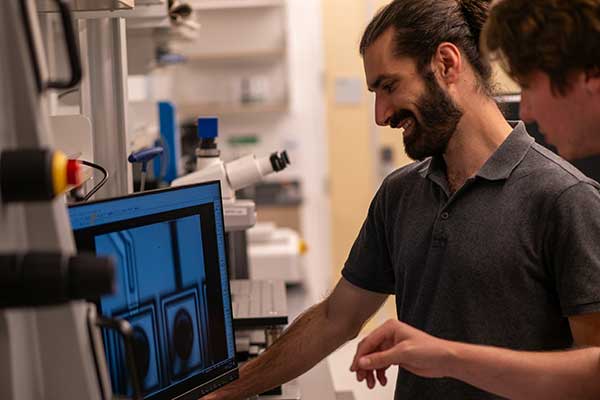Small scale,
massive impact.
The Institute for NanoSystems Innovation is a global hub focused on pioneering semiconductor research, learning, and innovation.
The Bicoastal Institute for NanoSystems Innovation launches.
NanoSI is located on the Boston and Oakland campuses. It aims to reshape “the landscape of chip-level technology advancements and applications.”
Our Imperative
The Institute for NanoSystems Innovation (NanoSI) aims to fulfill the promise of the Fourth Industrial Revolution of improving the quality of life for the world’s population by merging smart technologies with humans’ physical lives.
NanoSI fosters partnership between university, industry and government stakeholders to create new generations of smart devices and systems that are required by a number of industries.
Our Purpose
Learn how we researchers, government and industry strengthen the country’s semiconductor capacity.
↳
Our Research
Explore how we’re unlocking innovative solutions in fields ranging from medicine to electronics.
↳
Our Facilities
From Boston to Oakland, we leverage unique set of nationally distributed facilities and network nodes.
↳
The Future
NanoSI has its eyes on the future of US nano- and micro-systems processes. Learn how we’re at the cutting edge.
↳
We’re maximizing impact through the power of collaboration.
Our interdisciplinary nano systems faculty team combines expertise from fields like engineering, chemistry, entrepreneurship, and biology to innovate at the nanoscale.
EVENTS
2026 NanoSI Industry Engagement Board (IEB) Meeting
April 2, 2026
The 2026 NanoSI Industry Engagement Board Meeting brings together industry and academic stakeholders at Northeastern to showcase cutting-edge research and explore collaboration opportunities in chip-level technologies.
Northeastern 1st Summer School of Vibrometry
August 20-21, 2025
Northeastern University’s Institute for NanoSystems Innovation hosted a two-day immersive Summer School of Vibrometry featuring technical talks and hands-on training in laser Doppler vibrometry for students, researchers, and professionals.
NANO NEWS
Northeastern University is at the forefront of interdisciplinary nanotechnology and systems research. Explore all we are doing across our global research network.
Northeastern University Hosts Inaugural Summer School of Vibrometry in Collaboration with Polytec — A Resounding Success!
September 8, 2025
Northeastern University and Polytec hosted the inaugural Summer School of Vibrometry, offering hands-on training and expert instruction in laser Doppler vibrometry. The event brought together academia and industry around advanced vibration measurement techniques.
NanoSI Launches Singapore Research Attachment Program (SRAP) Partnership with Singapore’s Institute for Microelectronics (IME)
NanoSI is pleased to announce its participation with Institute of Microelectronics (IME) in the Singapore Research Attachment Program (SRAP), an international research training initiative funded by Singapore’s Agency for Science, Technology and Research (A*STAR). SRAP...
NanoSI Launches Singapore Research Attachment Program (SRAP) Partnership with Singapore’s Institute for Microelectronics (IME)
NanoSI is pleased to announce its participation with Institute of Microelectronics (IME) in the Singapore Research Attachment Program (SRAP), an international research training initiative funded by Singapore’s Agency for Science, Technology and Research (A*STAR). SRAP...

